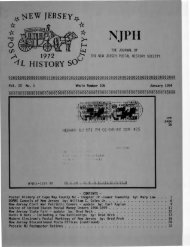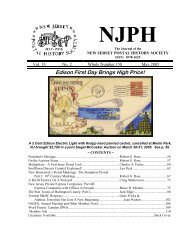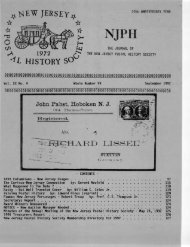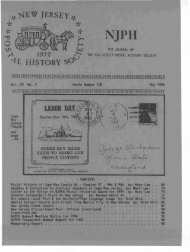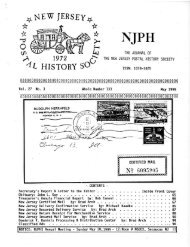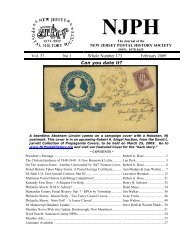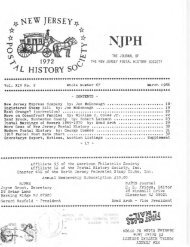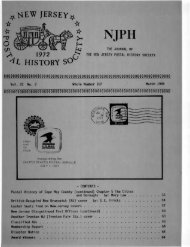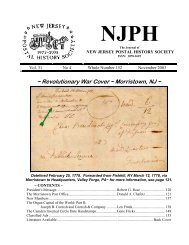185 - New Jersey Postal History Society
185 - New Jersey Postal History Society
185 - New Jersey Postal History Society
Create successful ePaper yourself
Turn your PDF publications into a flip-book with our unique Google optimized e-Paper software.
CIVIL WAR PATRIOTICS & THE BEVERLY, NJ HOSPITAL ~ Hughes, Walton, & Micchelli<br />
Mrs. Gibbons writes to another daughter, Julia:<br />
United States General Hospital, Beverly, <strong>New</strong> <strong>Jersey</strong>, .. August, 17th, 1864: “We have 700<br />
patients; eight buried last evening. I closed the eyes of four who arrived in the Atlantic from Fortress<br />
Monroe not twelve hours before. Barbarous to put dying men off on such a journey. We are all needed<br />
every moment, and next Second day 6 will bring twelve more nurses. …I perform my round as best I can.<br />
The greatest difficulty is to keep the townspeople out, which is only done by strict guard; they want to<br />
kill with what they call kindness.<br />
“How hard to believe that we have lived through so much the past weeks! I hardly dare think of a quiet<br />
sunset, so cloudy has been the morning and afternoon of my life so far. But if it all happens while I am<br />
here, and my children are permitted to enjoy a peaceful noon and evening, I shall be content, and die<br />
happy….."We draw our rations and do not allow Dr. Wagner to be at any expense for us.<br />
“My best love to thee, my beloved daughter, strength and hope of my days, a heart brim full.” 7<br />
Food was in short supply, although this seems to have been not from a lack of<br />
availability, but because of both Army mismanagement and graft: Food preparation was in the<br />
hands of the army, and the nursing staff was not allowed in the kitchens. There never seemed to<br />
be enough food for the patients, so gifts from the community were an important and useful<br />
addition to their diets. The nursing staff too contributed by using their own stipends (amounting<br />
to about $12 a month) to buy eggs and milk and other necessities to help fill out the diet of the<br />
soldiers.<br />
Georgeanna writes; from Beverly to her Mother, September, '64: “C. [Caroline] and I have 100<br />
men in our wards, all in bed. It is grimly amusing to hear the ward-surgeon say day after day, “Milk<br />
and eggs for 38.” For two days there have been no eggs at all, and the milk rations are always short.<br />
The ladies are not allowed in the kitchen, or to have anything to do with the food for the patients. No<br />
steak and potatoes or milk punch come into this ward. We have opened a private account for bread, and<br />
milk, and butter and eggs, enough for this ward, with the village store. Our ward-surgeon has gone to a<br />
horse race, which seems a pretty long one! The surgeon-in-charge is kind in manner, and draws rations<br />
strictly according to army regulations; and seems to think that the stewards are the best persons to<br />
manage the food business. The object of the minor officers seems to be to subsist the men on nothing,<br />
and avoid making a row. We cannot keep our men alive; eleven of them have died in three days.” 8<br />
Letters from Mrs. Gibbons further describe life at Beverly:<br />
To her daughter Julia, Beverly, NJ, ..Sept. 29, 1864: “Last evening, at six, a boat laden with<br />
wounded arrived. We were notified at three and had 319 beds to get ready. Two died between here and<br />
Philadelphia; two more to-day; we now have eight to bury. While the wounded and sick were being<br />
carried in, two ladies appeared. The husband of one was about to be put in the ground, but at her<br />
request was taken back, and he was sent home this morning. She accompanied, poor woman! How well<br />
she did in all her sorrow! the most unselfish of women! Instead of thinking her grief more than all<br />
others, she said: ‘Oh, here is a woman worse off than myself (turning to the other)-she has with her a<br />
baby six months old; her husband has been dead a week and she can neither see him nor take him<br />
home. I can do both.’<br />
“Martha Sever has been and is still very sick. Everybody is full of work and it is hard to break away, but I<br />
shall do it, because it is time to plan for the winter and I have much to do.” 9<br />
NJPH 36<br />
Vol. 40/No. 1<br />
Feb 2012 Whole No. <strong>185</strong>




